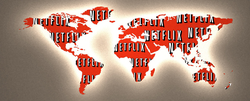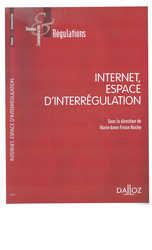Sectors
Compliance and Regulation Law Glossary

June 25, 2019
Breaking news

Le 24 juin 2019, le Régulateur irlandais a publié un rapport visant à participer à la consultation publique lancée par le ministère de la Communication, portant à la fois sur la façon dont il convient de transposer la directive européenne sur les services audiovisuels et sur la perspective d'une loi nationale sur la "régulation des contenus dommageables sur les plateformes en ligne".
Pour le Régulateur, le rapprochement des deux actes législateurs offre une opportunité d'une régulation globale des "médias en ligne", offrant à l'internaute une "sécurité" que la simple transposition de la Directive ne permet pas. Ainsi la seconde loi complétera la première.
Pour le Régulateur, la loi nationale à adopter doit permettre au Régulateur de donner une pleine sécurité à l'internaute irlandais ("online safety"), en retirant les contenants violents ou dommageables (le terme harmful est difficile à traduire par un seul mot en français) et en l'avertissant à propos de ceux-ci.
Comme l'explicite le rapport (p.52) :
The BAI considers that the following four strategic objectives and responsibilities are relevant for an online safety regulator operating within the new media regulatory structure: • Rectifying serious harms occurring to Irish residents through their use of online services. • Ensuring that individuals and members of groups that are frequently subject to harmful online content can fully benefit from digital technology and social media. • Reducing online harms by introducing online safety rules for online platforms. • Promoting responsibility and awareness of online safety issues among the general population and industry. To fulfil these objectives and responsibilities, the BAI considers that the Online Safety Regulator could have the following three functions:
1. Operating a statutory mechanism to remove harmful online content that directly affects Irish residents (Rectification of Harm)
2. Developing and enforcing an online safety code for Irish-resident online platforms (Minimisation of the potential for Harm)
3. Promoting awareness of online safety issues among the public and industry (Preventing Harm). Ensuring that online services play a more effective role in tackling online safety issues can provide wide, “collective” benefits to large numbers of individuals simultaneously.
Visant expressément Youtube et Facebook, qui en Europe ont choisi de se localiser en Irland, le Régulateur demande une Régulation des plateformes de partage de vidéos qui doit, à travers un Code s'appliquant à eux, permettre de régir leur activité qui se déploie à travers toute l'Europe. Ce Code aurait vocation à rappeler en premier le principe de la libre expression. Tout en organiser la "sécurité en ligne" de l'internaute.
Le Régulateur irlandais des Médias sera en charge de cela. Et puisque les opérateurs sont localisés en Irlande, ses conceptions et ses actions auront donc un effet européen : comme le dit le Président de l'Autorité de Régulation lui-même : " This is a particularly important issue for this country, given that many of the majoar international platforms are based her. Ireland has a unique opportunity - and responsability - to lead the debate and chart the way forward in relation to online safety and regulation".
____
"to lead" ?
Il n'est pas certain que les autres régulateurs nationaux ni la Commission européenne partagent une telle conception irlando-centriste de la régulation euroréenne des médias.
June 24, 2019
Thesaurus : Soft Law

July 19, 2018
Releases : I. Isolated Articles

July 1, 2018
Breaking news

March 27, 2018
Breaking news

Nov. 27, 2017
Breaking news

Sept. 6, 2017
Breaking news

Regulation of the digital world, we agree on its necessity, we talk about it a lot but it is difficult to do it.
The stakes are multiple: management of innovation, protection of people, treatment of different sorts of powers, future of the human being, the Politics and the Judge being like a bullet that ricochets between these 4 subjects.
It then rediscovers that the first "regulators" are the Governments and that the first modality of the Regulation Law is the taxation.
Notably in the digital field and even more so in the face of GAFA.
Indeed, the 4 American companies, Google, Apple, Facebook and Amazon, admit the need for rules but propose self-regulation or co-regulation. These would include not only their own behavior, but also those of others, including the fight against terrorism. Maybe, when one is stronger than the States, he should substitute himself for their core business....
Undoubtedly being dispossessed of the regalian, Europe today demands "accounts" to the GAFA in the literal sense of the term. Indeed, the French and German governments will table in September a tax proposal specific to the GAFA, the fruit of which will come back to the countries where they earn their income.
Concerned companies replied that in the tax system everyone has the right to be skilled and to organize at the best, so long as one does not fall into the abuse. In accordance with this legal conception, the French administrative high Court (Conseil d’État) has just recalled it in an important decision to their benefit.
In August 2017, the French Minister of Economy and Finance, Bruno Lemaire, justified the reiteration of his will to tax them, raising this issue at European level in the name of "distributive justice", the Law being defined as what gives everyone his share. This is a strong but dangerous argument, for while it is true that in the very function of taxation, correlated with public finances, the redistributive function is essential, tax optimization becomes staggering.
In a more convincing and regulatory way, this measure of equity is presented as correlated to the construction of the European digital market. It is an economic conception. To the extent that European taxation is still embryonic, its link with such a construction would make it possible to see in vivo the strength of the tax tool in Regulation Law, more than ever distant from Competition Law.
It is in this context, and because the European Digital Market must be built at forceps, since the GAFA will benefit from it, but also must participate in its construction, that such an investment sharing is justified.

Sept. 5, 2017
Breaking news

The Olympic Committee has just taken a stand: "sports competition" video games are contrary to the "Olympic values", because of their violence.
Can we do anything else? More or something else?
The case is a gap. Indeed, sports activities are regulated in the most traditional way, by administrative texts, administrative supervision, delegations, judicial control. There are rules, both legal and ethical. The most sophisticated rules have been developed, notably on "permissible violence" and that which is not, for example in the field of boxing or rugby, through the notion of "rules of the game".
Video games are at first sight quite different.
They are regulated by other bodies of rules and other regulators, such as the Regulatory Authority for Online Games, when they are played in the digital space.
But the Regulator of online games does not at first sight have competence to apply the "rules of the game" in the perspective of what sport is and the particular integration of the distinction between permissible violence and inadmissible violence.
Assuming that it extends its competence to that dimension, the fact that the blows carried are only "virtually" should necessarily modify the contour and the application of the rules, transforming this regulator of games into a regulator of sports.
Conversely, assuming that the sports regulators are concerned, it is necessary that the analogy between "game" and "sport" should be strong enough for the extension to take place legitimately.
The criterion that poses the problem is precisely le notion of "violence".
Read more below.

Sept. 4, 2017
Breaking news

The Internet has created an area of freedom, even libertarian space.
The flood of words is sometimes hateful. Never mind. This would be the price of freedom: it corresponds to the project of those who conceived the Internet, the places of expression and creation, even the worst, and the political and legal culture of the United States, a system in which the freedom of expression has constitutional value.
This in particular allows for the development of ideas spreading so-called "neo-Nazi" thinking, as the Stormfront site has been doing for years.
On August 25, 2017, the private company, Network Solutions that hosts the site and provides it with the domain name terminated hosting and deleted the domain name.
The host also banned the web master from rebuilding the site or transferring it in any way.
This case gives rise to a debate on the rise of extremists in the United States on the one hand and the limit of freedom of expression on the other.
What is here to be noted is the power of a web host in the matter.
___
The manager who made the decision found it necessary to justify himself, as a Regulatory Authority would have done, giving grounds for a sanction decision, even though he can avail himself of the general conditions of use that are accepted by the entities that create and operate the sites.
Read more below.
Nov. 2, 2016
Events : JoRC

Sept. 14, 2016
Thesaurus : Soft Law

July 4, 2016
Breaking news

Speaking to the press is a way for the Regulator to reach everyone, including policymakers, European institutions, and fellow Regulators who also seek to compete for space in the digital area.
As he reported: "Nous arrivons aujourd’hui, avec l'irruption du numérique, à un acte 2 de la régulation. Il y a 20 ans, on est passé du modèle PTT où l’Etat produisait le service public, au modèle d’État-régulateur qui a permis l’ouverture à la concurrence. Ce modèle vise à une bonne organisation du marché avec des outils de pilotage efficaces, mais parfois très intrusifs : les licences mobiles, qui sont des contrats assortis de sanctions administratives en cas de non-respect des obligations, ou le dégroupage, qui est une intervention sur la propriété privée… Aujourd’hui il nous faut franchir une étape nouvelle et nous projeter dans la suite, repenser nos outils pour permettre, en complément, une régulation plus focalisée, plus humble et plus agile". We can translate this passage as it follows : “As of today, considering the onset of digital, we are getting to a second phase for Regulation. Over the past 20 years, we went from the ‘PTT model’, where the State provided for public service, to a new Regulatory State model that enabled competition to thrive. This model aims for good market organization with effective management tools, which may be sometimes very intrusive: e.g., mobile licenses, which are agreements that include administrative penalties in the event of failure to comply with its provisions, or unbundled access, which relates to a State intervention on private ownership… Today, we need to take it another step further and plan for the future, reconsider our tools to allow for a Regulation that would be better focused, humbler and nimbler”.
Whatever “Phase 1” was would thus be already outpaced. Farewell stringent public service, so long market openings to competition. Such an understanding of Regulation was certainly consistent with the idea that Regulation was only meant to be temporary, namely considering the everlasting protection of personal data by the dedicated supervisory authority (Commission Nationale Informatique et Libertés, CNIL)…
We would then need to implement “Phase 2” and, as Sébastien Soriano advises, to “Regulate by the multitude”, which is "a concept that includes consumers, but also users, observers, and the civil society as a whole. The key question is how to use the power of information to get the greatest possible leverage on the market while relying on the multitude. The answer is clear: Regulation by data" ("La multitude, ce sont les utilisateurs, les observateurs, la société civile. Cela inclut les consommateurs, mais pas uniquement. Et la question centrale, c’est comment utiliser le pouvoir de l’information pour avoir un maximum d'effet de levier sur le marché et grâce à la multitude. La réponse, c’est la régulation par la data.").
Like all the others, the Telecom Regulator introduces himself as a sort of ‘natural’ Regulator for digital activities, as he relies on the key notion that is information. In doing so, he is seeking allies that are just as natural as he is— that is to say, consumers. Consumers fall indeed into the scope of the Regulator insofar as they provide him with the information he needs to Regulate the digital sector and space.
The Regulator thus does not define himself anymore as the one that protects consumers against the market, but as the one that binds the two together, transforming the complaint into a civic act: “There’s a problem. As a consumer, I am alerting you as a Regulator who has the means to regulate market failures and whom I shall let operate”.
In such a statement, the ARCEP not only becomes the ‘natural’ digital Regulator, but it also become the one that operates on the grounds of information brought by the web-user, who is protected by and who somehow benefits in return from the action of the Regulator.
Two concluding thoughts:
- What a nimble reasoning indeed from the Regulator, who had initially been created to be the ‘container Regulator’, and who is now becoming, since Phase 2 is on its way, a kind of ‘overall’ Regulator that regulates both the container and the content.
- This is a salient example that rationales and frameworks that were developed by the Banking and Financial Regulation are modelling Regulation in general: see whistleblowers, information, obsolescence of the ‘public service’.

June 20, 2016
Breaking news

Little is known about how to ‘regulate the Internet’…
Outline solutions, however, do seem to have to be found in ex-post mechanisms since Regulation (broadly speaking) understand ex-ante and ex-post mechanisms as a continuum, and since Regulators increasingly concentrate ex-post mechanisms in their hands as an effective way to ensure execution of the ex-ante prescriptions they themselves elaborated.
Ex-ante mechanisms aim at making algorithms more ‘loyal’.
As long as we hope for devices to be trustworthy and to be held accountable for their ‘loyalty’, we give merits to the idea that we probably should “take liability seriously”.
On June 14, 2016, the Californian father of one of the victims of the 11/13/2015 Paris attacks filed a suit in a U.S. District Court to prosecute Google, Facebook and Twitter.
The legal dispute is clear.
The applicant based its claim to hold the companies liable on the grounds that they let terrorist groups use their networks: “The suit claims the companies “knowingly permitted” the Islamic State group, referred to in the complaint as “ISIS”, to recruit members, raise money and spread “extremist propaganda” via their social-media services”.
Conversely, the defendants unanimously claimed that they had actively implemented ‘policies’ against extremist material, and that they were working with law enforcement entities to improve regulations on the matter. Self-regulation and ethics versus common liability law.
The companies also pointed out the fact that they were not publishers, hence they could not face liability for the material users post on their networks. This is not, however, the issue at stake: the complaint concerns the use of the network not as a mere way to broadcast messages, but as a way to recruit murderers, provide them with convenient tools to communicate and to prepare criminal operations—allegations for which law does not exempt social media companies from liability.
These allegations are worth being ‘taken seriously’, should the law be unclear on whether the companies could be charged indeed, and should the total exemption from liability of such companies pleading for their ‘neutrality’ be the exception rather than the norm.
The question of principle is thus as follows: is exemption from liability of those who hold the ‘digital space’ together really the norm?
If so, their exemption from liability needs to be extended to a scenario that had not been covered by the law yet. If not, then common liability law is the rightful legal basis to assess whether the companies can be found liable or not—provided that a direct causal link between the unlawful act and an actual harm suffered by the applicant can be demonstrated.
The legal dispute is clear.
Sept. 16, 2015
Events

April 16, 2015
Thesaurus : Doctrine

Feb. 20, 2015
Breaking news

Internet needs to be regulated, but by whom and from what criteria?
The high speed building of very different cases shows the urgency of reflections on the principles.
Consider the case in which just entered the British Regulatory Authority Advertising Standards Authority (ASA). Thiss Authority isn't specific to the Internet but the fact the behavior takes place on the Internet doesn't stop the Regulator, the ASA applying its control on "all media".
An Irish betting company organized bets about a future event: conviction or acquittal of Oscar Pistorus for the death of his fiancée. The latter doesn't deny being the author of the fatal blow but claims that he isn't responsible legally.
The website reproduces the accused of a very recognizable way in the form of an Oscar statuette. This is due to the homonymous first name and the statue of the reward. But this is also a triple ambiguity created by the company.
Secondly the statue can't walk as the athlete si one takes off his prosthetic that made him win races.
Thirdly and more than that, if convicted, he remains in prison, Oscar Pistorum would continue to be deprived of his freedom to come and go, and therefore still unable to "walk" freely, the betting firm indicating that it will reimburses money if the accused will "walk" (out of prison - as a sort of miracle ...).
_____
Watching that, more than 5,000 people protested. But before whom? In this excess of regulators, people turn to perhaps the most dynamic: in the UK it is probably the Advertising Standards Authority (ASA) .
But what to blame?
One could have said that it is illegal to bet on the outcome of a trial.
One could argue that you can't bet about a terrible history, whose center is the death of a young woman.
But it's rather toward the disability side and "minority rights" that the case is taking shape. Indeed, associations see it as primarily a mockery of people who can't walk.
Without further developed if the ASA takes a position on this advertising that the company has since removed, it will take a strong position in the regulation of the Internet and could for example clarify and prioritize the interests that must be respect in the virtual world.
Jan. 12, 2015
Breaking news

France Stratégie is the French public body that advises the French Government on economic and social policies.
In January 2015, one of its researchers, Medhi Nemri, published an analytical note: "Demain, l'Internet des objets (Tomorrow, the Internet of Things)".
The release sees the Internet as a "essential facility" whose development capabilities will allow interaction between objects: the "Internet of Things". This world of "connected devices" would be a "tipping".
Indeed, the objects are connected in the industrial system (smart manufacturing) and the municipal utilities are beginning to organize themselves in the same way. The note stresses the importance of fostering an open platform for all public services. Private space is organized in the same way, for example health, but individuals often see these connected objects as gadgets. Yet by the technology platforms, interconnection allows a general improvement of services. The more traditional companies may depend on Internet companies developing these platforms.
The issue of power of this economy are standardization and standard naming of objects. In this ecosystem, data are the creation of economic value.
The author of the paper proposes the idea of a "right to experiment" way to foster innovation. This would in mobility, health management, insurance. The note doesn't specify the consequences of such a "right to experiment": Does this mean a decline in sectoral regulations?
In any case, the note stresses the need to reaffirm the rights of persons and to protect privacy.
Dec. 18, 2014
Breaking news

Virtual currency is a perfect example of the difficulties of interregulation: indeed, the bitcoins are currencies created on the Internet, usually to play games, such as poker. Thus intersect banking regulation, banking supervision, regulation and control of the game, Internet regulation itself.
____






